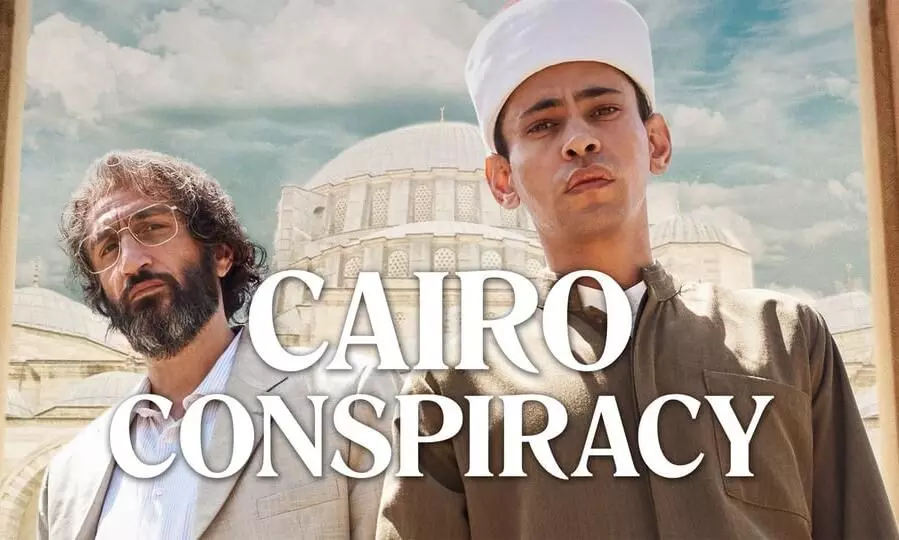
Cairo Conspiracy aka Boy from Heaven: beyond power, truth and politics
text_fieldsThere are films that are designed to be experienced in its entirety, allowing viewers to grasp everything they intend to tell us, while there are others that invite deeper exploration and understanding beneath the surface. We are forced to experience the pain and pathos that the characters go through, we are enticed into the subtleties and implications kneaded throughout the narrative and thus understand the darker and deeper meanings. Cairo Conspiracy, also known as Boy from Heaven, is a political and religious thriller that offers numerous layers of meaning and reflections alongside its more explicit themes. As a bold piece of art by the Swedish filmmaker Tarik Saleh, the movie drags us into the world of conspiracies, where religion and state strive hard for the ultimate retention of power.
Set within the prestigious Al Azhar University of Cairo, Egypt, established in CE 972 and recognized as the foremost Islamic institution globally, this narrative presents an engrossing account of political intrigue. The story focuses on Adam, a boy in his twenties, from a coastal village background who is unknowingly recruited by Colonel Ibrahim, a state security officer, to act as an informant and influence the election of the university's grand imam. This role carries substantial weight in Sunni Islam, and the government aims to ensure the election of their favoured candidate over another cleric associated with the Muslim Brotherhood, an organization that has been characterized by some as an extremist entity. The tale unfolds as a suspenseful political thriller, revealing the complexities of political strategies and the lengths to which individuals will go to achieve their goals.
In the opening scene, we meet Adam (Tawfeeq Barhom) paddling his small fishing boat with his Abba, in the backdrop of the sea, which offers them a life, but not happiness indeed. The haunting silence between the father and the son is deeper and more turbulent than the ambient noise of the ocean and the howling salty winds. He takes care of the two younger brothers and their home represents the struggles and limits they go through. Adam visits the village imam and receives an invitation letter from Al Azhar University to join there, with a scholarship. He hides the letter from his family and later reads it under his bed sheet which evidently hints at the fear of objection from his father. A sigh of relief comes into our hearts when the next morning his Abba surprisingly talks to him about the admission by quoting his mother’s last wish to teach him.
In an unexpected turn of events, the grand Imam dies shortly after the arrival of Adam at the University. This fuels a hushed disruption between the top and bottom of the systems and structures, both in Al-Azhar and at the government levels. Here, the movie offers us a unique insight into the power dynamics where the strategic interactions of people who regulate and dominate the discourses, evidently unmask the evil and the unholy. As it eventually becomes clear who actually the major player in the game is and who their chess piece is, it becomes even more exciting.
For Adam, life eventually turns into a dreadful experience, after he becomes the eyewitness of the murder of his friend, Zizo, who was an assistant to the blind Sheikh Negm. As the investigation begins, Colonel Ibrahim finds out the deeper conspiracies in the inner circles of Al Azhar and also chooses Adam as a mole to update the happenings inside the institution. Adam’s days as an informer began to give him shocking revelations as he eventually discovered the existence of an extremist group inside the campus with vile ideologies of revolution. His constant meetings with the colonel at a café in the town build more and more apprehensions about the larger systems of religion and politics and the unethical dogmas that regulate them.
At this point, the movie portrays how individuals purging themselves of all their sins, worries, and grime, while they demonstrate daily religious hygiene rituals, are nothing less but the quintessence of hypocrisy and snobbery. We see the dirt that stains the inner and outer realms of religious and political foundations. The political games played by the state, in the undesirable pathways that contradict the stated principles of Islam give us a chilling experience and also allow us to understand the nuances of a civilization when religion merges with society.
We see the other side of Islam, as an institution, where they deviates from the traditions and lessons transmitted orally and in writing, and can understand the hypocrisy of that system which endures only because it gives a select few people the ability to rule over and control everything and everyone.
Furthermore, the tension mounts when Adam is being suspected and caught by Abdul Jabbar Al Suhiri, the extremist leader and is forcefully taken to the top of a tower, where he witnesses the death of Zizo. Colonel Ibrahim reaches there in time and rescues Adam before any harm is done to him. This later gives Adam a chance to replace Al Suhiri and serve as an assistant to Sheikh Al Dhurani, who is in pursuit of becoming the new Imam but is quite despised by the state as well as his colleagues for his gruesome actions in the past. In his journey of epiphanies, Adam learns about the unethical life that Sheikh Al Dhurani leads and decides to unmask him in front of the world. He asks questions about illegal child marriage and exposes Dhurani’s wrong intentions just before the election of the grand Imam. As a result, Sheikh Omar Beblawi, who is the president’s choice, wins the election, making Adam’s mission successful for the time being.
But, the whole narrative takes a turn, and a shocking twist happens in the life of Adam when the authorities realize that he could be the ultimate evidence against the state. The rest of the movie is the best part of it, where we see how life and death can play a game of luck between them and still as individuals we hold nothing in control of them.
The story serves as a thrilling political drama that highlights the complexities of political manoeuvring and the extreme measures that individuals may take to fulfil their ambitions. It presents a compelling narrative filled with deceit and manipulation, illustrating the profound corruption within the Egyptian political-military framework and the religious establishment, ultimately offering a bleak perspective on those in authority. If there is something that we miss in this movie, it’s women! There is no single shot of a woman in the whole movie and surprisingly that is not coincidental. No wonder, in a system where patriarchy designs and speaks for everyone, women are literally and symbolically invisible. Cairo Conspiracy will disturb you in the deepest corners of your heart as it speaks a thousand hidden layers of truths about the other side of religion and the state which revolves around the luminaries of power.






















